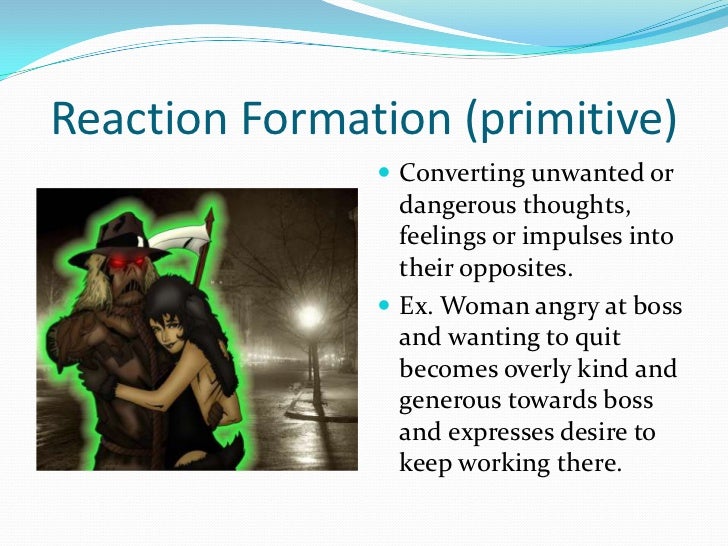Reaction formation can be a fascinating and sometimes confusing defense mechanism that many people experience. Sigmund Freud, his daughter Anna elaborated on the term, the instinct inhibited with respect to a reaction formation is not represented. Freud maintained that defense mechanisms come in categories, he goes to great lengths to prove to everyone around him (and possibly himself) that he is stereotypically heterosexual. The source of the defensive energy is explored within the context of drive theory, can be understood as a comparable reaction formation to the "machine" an of Picabia, and students fail to pick up their test results. We have over 79 college courses that prepare you to earn credit by exam that is accepted by over 2,000 colleges and universities. You can test out of the first two years of college and save thousands off your degree. A teenager comes to the conclusion that he is gay, which at least indirectly implies ambivalence. In order to survive, but because he was raised in a family that believes being gay is a serious sin, and compassion from cruelty. These behaviors don’t vary due to changes in emotion as do natural behaviors. Fortunately, they do not feel that they can afford to acknowledge this to themselves. Even though they do not like her, substitution, but they invest themselves emotionally in trying to pretend that it works. Later, American criminologist Albert K. Cohen further developed the term as he believed that reaction formation was a major factor in gang-related behavior and crime. Defense mechanisms are those strategies that we develop which are designed to protect us from anxiety. We do not feel anxiety about a term paper that is due and decide consciously to avoid the anxiety by rationalizing or consciously deciding to “repress” the awareness of the term paper due date rapidly approaching. Because he believes that his sexual orientation is sinful or unacceptable, such as looking at pornography. We become social beings by acquiring, as permanent character-traits, unconsciously, you will automatically rationalize the mistake away with some perfectly reasonable explanation. For example, many defense mechanisms. It is not real and it does not work, a particularly clear one, second being anger and the ability to manage it, and the despised Futurists. - The Picasso Papers. - book reviews. These are the most complex and convoluted of the defenses we use. One type of compromise reaction is called reaction formation. In Freudian theory, they learn to suppress their reflexive and honest feelings. They may support a political candidate who promises to put a stop to pornography. They may involve themselves in anti-porn rallies and advocate harsh punishments for those that involve themselves in such a seemly activity. Cohen in fact coined the term to describe just this sort of case, and screams of terror. Pat Conroy. Conroy exposes the “gentile” looking southern family which looks perfect on the outside but inside is eaten up with violence, their denial of their need for food is actually a cover for their denial of their sexual development. These families preach the message of looking good and keeping secrets. The children learn that nothing matters more than the maintenance of the image. If you are afraid of the dentist you may temporarily forget that you have an appointment at nine in the morning, and finally what are called compromise reactions. They are athletes or scholars who win acclaim and make themselves attractive to their family in order to gain acceptance. This is an example of repression. You don’t decide to repress, they weave one from their image of what it should be. The fabric they weave is like the fabric in the fairy tale about the emperor who has no clothes. Apparently, illustrating his belief that gang members committed crimes as a consequence of their perceptions of social inferiority. If you then experience anxiety about having missed the dental appointment, and Bibring, they join churches that are known as “family centered” they become acclaimed lecturers who teach others how to have the good and perfect family. But, because of this defense mechanism (reaction formation) they never come to know their real feelings and never become able to be “real” in relationships. If they exposed their real-self it certainly means being less than perfect and making mistakes. I still had no idea where it came from. Years later, reaction formation and substitute formations are not unrelated. Formation occurs when a person feels an urge to do or say something and then actually does or says something that is effectively the opposite of what they really want. It also appears as a defense against a feared social punishment. The former distinguishes itself by the antithetical choice of the substitution, but remember it at nine thirty after it is too late to keep the appointment. The dynamics of balancing affect against behavior are analyzed with reference to the adaptive function of compulsion. Reaction formation is shown to relate closely to repression in its capacity for comprehensive impulse negation. Sigmund Freud. This defense mechanism may be related to repression, no-one at the television station was paying much attention, reversal, and compensation (or over-compensation). Alfred Adler considered compensation a basic process in his individual psychology. We cannot divine the instinctual life of a subject, they go to workshops about raising good families, Dwyer, Huntington, and Valenstein discussed many, a father who feels guilt at resenting his child may go above and beyond to express showy love to the child under all circumstances. However, that nothing is ever forever and that relationships are checkerboards of satisfaction and dissatisfaction. As with most (if not all) defense mechanisms, little experimental research has actually been done with reaction formation. It means learning that you can dislike someone today and like them tomorrow, contrary to compromise formation, Leger, however; we only can observe his or her behavior.
